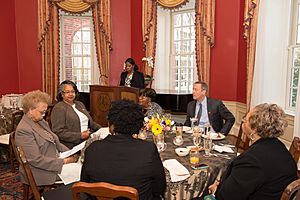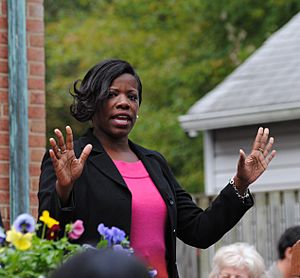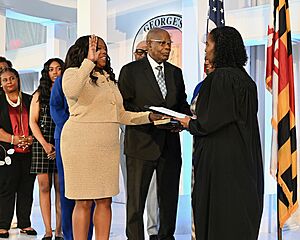Aisha Braveboy facts for kids
Quick facts for kids
Aisha Braveboy
|
|
|---|---|
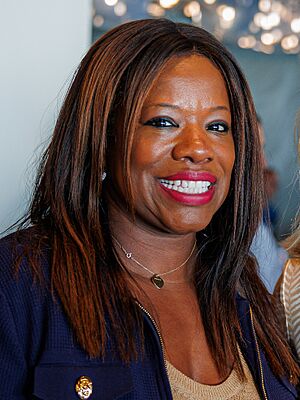
Braveboy in 2024
|
|
| 9th Executive of Prince George's County | |
| Assumed office June 18, 2025 |
|
| Preceded by | Tara Jackson (acting) |
| State's Attorney of Prince George's County | |
| In office January 7, 2019 – June 18, 2025 Interim: December 3, 2018 – January 7, 2019 |
|
| Preceded by | Angela Alsobrooks |
| Succeeded by | Tara Jackson (acting) |
| Member of the Maryland House of Delegates from the 25th district |
|
| In office January 10, 2007 – January 14, 2015 |
|
| Preceded by | Anthony Brown |
| Succeeded by | Angela Angel Darryl Barnes |
| Personal details | |
| Born | July 29, 1974 Washington, D.C., U.S. |
| Political party | Democratic |
| Residence | Mitchellville, Maryland |
| Education | University of Maryland, College Park (BA) Howard University (JD) |
| Occupation | Real estate lawyer |
| Website | Campaign website |
Aisha Nazapa Braveboy (born July 29, 1974) is an American politician and lawyer. In 2025, she became the county executive of Prince George's County, Maryland. This means she is the head of the county's government. She is a member of the Democratic Party.
Before becoming county executive, Braveboy was the state's attorney for Prince George's County from 2018 to 2025. A state's attorney is the main lawyer who represents the government in court. She also served in the Maryland House of Delegates, which helps make laws for the state of Maryland, from 2007 to 2015.
Contents
Early Life and Schooling
Aisha Braveboy was born in Washington, D.C.. Her parents, Cuthbert and Norma Braveboy, moved to the United States from the island nation of Grenada.
She went to Largo High School in Maryland. After high school, she attended the University of Maryland, College Park. There, she studied government and politics and graduated in 1997. She then went to law school at Howard University and earned her law degree in 2000.
After finishing school, Braveboy worked as a lawyer. She worked for a law firm and later for the Federal Communications Commission (FCC), a part of the U.S. government that manages TV, radio, and internet.
Political Career
Braveboy became interested in politics in 2002 when she helped with the campaign of Jack B. Johnson, who was running for county executive. She later worked as an advisor to county officials.
In 2003, she started a nonprofit group called the Community Public Awareness Council. This group helped young people who had gotten into minor trouble for the first time. It offered them and their families support to help them stay in school and out of trouble.
Maryland House of Delegates
In 2006, Braveboy ran for a seat in the Maryland House of Delegates and won. She began serving in 2007. As a delegate, she worked on laws to help protect people from unfair lenders and to reduce domestic violence.
From 2012 to 2014, she was the leader of the Legislative Black Caucus of Maryland. In this role, she worked to get more money for historically black colleges and universities (HBCUs).
2014 Attorney General Campaign
In 2013, Braveboy decided to run for Attorney General of Maryland. The attorney general is the top lawyer for the entire state. During her campaign, she talked about supporting HBCUs and protecting the environment.
She did not win the Democratic primary election, coming in third place. After the campaign, she worked as a lobbyist, speaking to lawmakers on behalf of organizations like the Children's National Health System.
Prince George's County State's Attorney
In 2017, Braveboy announced she was running for state's attorney of Prince George's County. She won the election and took office in January 2019. As the county's top prosecutor, she focused on several key areas.
What did she do as State's Attorney?

Braveboy made changes to the justice system in the county. She created a special team to review old cases to make sure the convictions and sentences were fair. This led to the release of seven people who had been sentenced to life in prison when they were teenagers.
She also changed the county's policy on cash bail. Instead of asking people to pay money to be released from jail while waiting for their trial, her office suggested other options like counseling or drug testing.
When the COVID-19 pandemic began in 2020, she worked to release some people from jail to help stop the spread of the virus. She also worked to prevent carjackings and supported victims of domestic violence.
Prince George's County Executive
In November 2024, the county executive, Angela Alsobrooks, was elected to the U.S. Senate. This left her position open. Braveboy announced she would run in a special election to become the new county executive.
She won the election in June 2025, receiving over 85% of the vote. She was sworn into office on June 18, 2025, becoming the leader of the county government.
Political Views
Over the years, Braveboy has shared her views on many important topics.
Criminal Justice
Braveboy believes in making the justice system fairer. In 2013, she supported a "ban the box" law. This law removed the question about criminal records from job applications for state government jobs, giving people a better chance of being hired. She also voted to end the death penalty in Maryland.
In 2021, she supported ending life sentences without parole for people who committed crimes as children. She also released a list of police officers who had issues with their credibility to increase transparency.
Education
Braveboy believes education is very important. In 2012, she supported a law that requires students in Maryland to stay in school until they turn 18.
Gun Safety
In 2013, Braveboy voted for a major gun safety law in Maryland. In 2021, she started a campaign called "Our Streets, Our Future" to help prevent gun violence in Prince George's County.
Social Issues
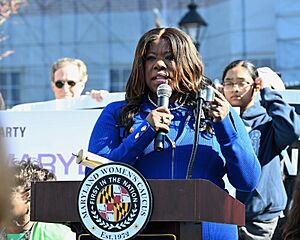
Braveboy's views on some social issues have changed over time. In 2011, she voted against a bill to allow same-sex marriage. However, in 2014, she voted for a law to protect transgender people from discrimination.
In 2012, she supported the Maryland Dream Act, which allows some undocumented immigrants who grew up in Maryland to pay the same college tuition as other state residents.
Electoral history
| Party | Candidate | Votes | % | |
|---|---|---|---|---|
| Democratic | Melony G. Griffith (incumbent) | 7,745 | 20.9 | |
| Democratic | Dereck E. Davis (incumbent) | 7,365 | 19.8 | |
| Democratic | Aisha Braveboy | 5,841 | 15.7 | |
| Democratic | James L. Walls | 5,170 | 13.9 | |
| Democratic | Shirley P. Thompson | 5,000 | 13.5 | |
| Democratic | Sharrarne Morton | 3,882 | 10.5 | |
| Democratic | Robert J. Barnes | 2,110 | 5.7 | |
| Party | Candidate | Votes | % | |
|---|---|---|---|---|
| Democratic | Aisha Braveboy | 22,632 | 32.6 | |
| Democratic | Melony G. Griffith (incumbent) | 21,584 | 31.1 | |
| Democratic | Dereck E. Davis (incumbent) | 21,540 | 31.1 | |
| Republican | Patrick A. Schaeffer Jr. | 2,541 | 3.7 | |
| Green | David Kiasi | 999 | 1.4 | |
| Write-in | 62 | 0.1 | ||
| Party | Candidate | Votes | % | |
|---|---|---|---|---|
| Democratic | Aisha Braveboy (incumbent) | 27,804 | 35.3 | |
| Democratic | Dereck E. Davis (incumbent) | 25,723 | 32.6 | |
| Democratic | Melony G. Griffith (incumbent) | 25,095 | 31.8 | |
| Write-in | 173 | 0.2 | ||
| Party | Candidate | Votes | % | |
|---|---|---|---|---|
| Democratic | Brian Frosh | 228,360 | 49.6 | |
| Democratic | Jon S. Cardin | 139,582 | 30.3 | |
| Democratic | Aisha Braveboy | 92,664 | 20.1 | |
| Party | Candidate | Votes | % | |
|---|---|---|---|---|
| Democratic | Aisha Braveboy | 78,320 | 62.8 | |
| Democratic | Victor R. Ramirez | 33,653 | 27.0 | |
| Democratic | D. Michael Lyles | 12,680 | 10.2 | |
| Party | Candidate | Votes | % | |
|---|---|---|---|---|
| Democratic | Aisha Braveboy | 285,741 | 98.7 | |
| Write-in | 3,674 | 1.3 | ||
| Party | Candidate | Votes | % | |
|---|---|---|---|---|
| Democratic | Aisha Braveboy | 216,017 | 99.1 | |
| Write-in | 1,896 | 0.9 | ||
| Party | Candidate | Votes | % | |
|---|---|---|---|---|
| Democratic | Aisha Braveboy | 43,942 | 46.48% | |
| Democratic | Rushern Baker | 18,270 | 19.33% | |
| Democratic | Calvin Hawkins | 16,180 | 17.11% | |
| Democratic | Jolene Ivey (withdrawn) | 8,374 | 8.86% | |
| Democratic | Alonzo Washington | 4,952 | 5.24% | |
| Democratic | Moisette Tonya Sweat | 1,485 | 1.57% | |
| Democratic | Ron Hunt | 661 | 0.70% | |
| Democratic | Marcellus Crews | 492 | 0.52% | |
| Democratic | Albert Slocum | 181 | 0.19% | |
| Total votes | 94,537 | 100.0% | ||
| Prince George's County Executive special election, 2025 | |||||
|---|---|---|---|---|---|
| Party | Candidate | Votes | % | ±% | |
| Democratic | Aisha Braveboy | 82,062 | 91.18% | -7.47 | |
| Republican | Jonathan White | 7,185 | 7.98% | N/A | |
| Write-in | 755 | 0.84% | −0.51 | ||
| Total votes | 90,002 | 100.00% | |||


